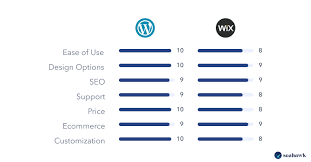In the ever-evolving landscape of website development, selecting the right platform is crucial for success. Two popular options that cater to different needs and preferences are WordPress and Wix. In this article, we’ll delve into the strengths and weaknesses of each platform to help you make an informed decision that aligns with your website goals.
- Ease of Use:
- Wix:
Wix is renowned for its user-friendly interface, making it an excellent choice for beginners. With a drag-and-drop builder and a plethora of templates, users can easily customize their sites without any coding knowledge. - WordPress:
While WordPress has made strides in user-friendliness, it traditionally had a steeper learning curve. However, with the introduction of the Gutenberg editor, creating content has become more intuitive. Yet, customization and optimization might require some technical skills.
- Flexibility:
- Wix:
Wix provides a range of templates and allows users to customize them extensively. However, this customization is within the confines of the template structure, making it more suitable for those who prioritize simplicity over absolute freedom. - WordPress:
WordPress, being an open-source platform, offers unparalleled flexibility. Users can choose from thousands of themes and plugins, and developers can delve into the code for deep customization. This flexibility, though, requires a learning curve and possibly some technical expertise.
- Scalability:
- Wix:
Wix is an excellent choice for small to medium-sized websites. However, as your site grows, you may encounter limitations in terms of scalability and advanced functionality. - WordPress:
WordPress is highly scalable and used by small blogs to major news outlets. Its extensive plugin ecosystem allows users to add features as needed. This scalability makes it an ideal choice for businesses with long-term growth plans.

- SEO Capabilities:
- Wix:
Wix has made improvements in its SEO features, offering tools like customizable meta tags and SEO patterns. However, some argue that it may not be as SEO-friendly as WordPress. - WordPress:
WordPress, with its SEO plugins like Yoast SEO, gives users comprehensive control over their site’s SEO. The ability to optimize content, manage metadata, and implement SEO best practices makes it a preferred choice for those serious about search engine visibility.
- Cost:
- Wix:
Wix operates on a subscription-based model, with plans catering to various needs. While it’s easy to start with a free plan, unlocking advanced features often requires a premium subscription. - WordPress:
WordPress itself is free, but you’ll need to pay for a domain name and hosting. Themes and plugins may also come with costs. The overall cost can vary depending on your needs, but the flexibility to choose your hosting provider can be cost-effective in the long run.
Conclusion:
In the WordPress vs. Wix debate, the right choice depends on your specific requirements. If you prioritize simplicity, quick setup, and a user-friendly interface, Wix may be the better option. However, if you seek scalability, flexibility, and robust SEO capabilities, WordPress could be the ideal fit. Ultimately, understanding your goals and the nature of your website will guide you towards the platform that aligns best with your vision.


